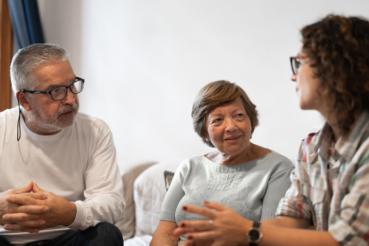We spend much of our young lives pushing thoughts of death to the backs of our brains.
But the reality of it becomes clearer as we grieve losses of friends and family. We struggle with facing our own mortality, so how do we help others who have been diagnosed with a life-limiting illness or experienced the loss of a loved one?
Rev. Clayton Thomason, JD, MDiv, a chaplain at Rush, offers some guidance on how to address this difficult but unavoidable subject.
If you know someone with a life-limiting illness, such as cancer, you can offer help in many meaningful ways, Thomason says. Here are some suggestions:
- Visit them at home or in the hospital; while hospitals may make you uneasy, it will do both of you good.
- Let them and those around them grieve. "Grief is perfectly normal, and it should be acknowledged," Thomason says.
- Listen to them as they reflect on their lives; share photos and stories.
- Help them re-envision their futures in light of physical changes and restrictions. For example, if they planned to travel the world in retirement and it's no longer feasible, bring them travel books or encourage them to join a travel discussion group online.
- Connect them with friends. Illness can often pull people away from activities that formed the basis of friendships.
- Provide reassurance that loved ones will be cared for; leaving loved ones behind is often a source of anxiety.
Providing support after a death
Thomason's advice for comforting those with life-limiting illnesses can also be applied to those who are grieving the loss of a loved one. He also recommends the following:
- Encourage them to reflect on previous losses and the strategies they used then to cope. "By the time we reach a certain age, we actually become quite adept at navigating grief," Thomason says.
- Assure them that they are not alone in what they are feeling; you, too, have suffered loss. But be wary of using sharing as a tool to work through your own grief, Thomason says. Your baggage won't help comfort others.
But be wary of using sharing as a tool to work through your own grief. Your baggage won't help comfort others.
Planning ahead
"Only about 10 percent of deaths occur without some sort of warning," Thomason says. "While that might seem unsettling, it can also be incredibly comforting. Most of us have the gift of time."
We can use this time, Thomason says, to not only anticipate loss but to plan for it and help others do the same. By facing and planning for our own mortality, we can find comfort and closure.
Planning can entail tasks both great and small:
- Get paperwork in order (e.g., a will and advance directives)
- Establish goals, whether it’s nurturing a neglected relationship, going on a long-awaited trip or reconnecting with your spirituality
- Consider how you want to be treated at the end of your life by reflecting on past losses and expressing your wishes to others (in writing or otherwise). For example, if faced with a life-limiting illness, do you want to be cared for in a medical facility or at home? Do you want to be surrounded by your entire family at the end or just your significant other?




